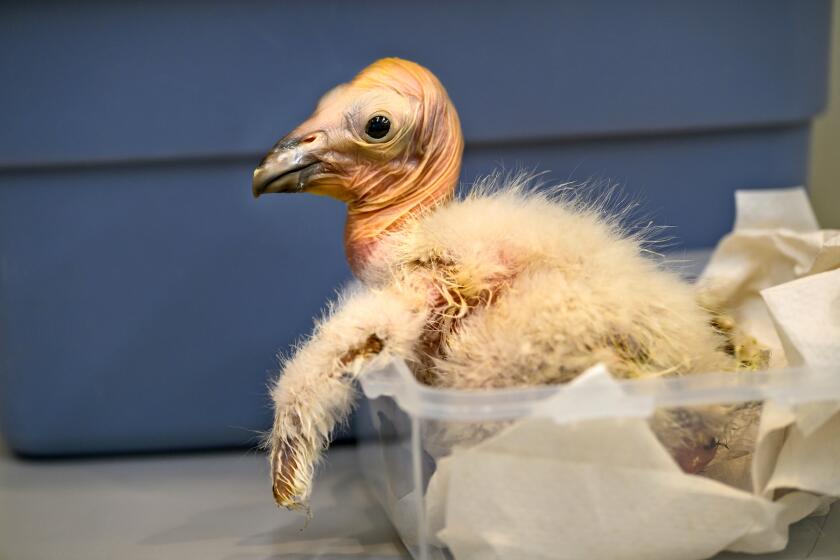Differing Opinions : Researcher’s Finding Stirs Debate on Causes of Homosexuality
“Hogwash” is how Irv Sittler describes the new study that found differences in the brains of gay and heterosexual men. But like many others, he is intrigued by the idea that a physical trait might indicate sexual orientation.
“What if you could open up someone’s brain and measure it for gayness?” Sittler, who is gay, said Friday as he stood outside A Different Light, a gay and lesbian bookstore in West Hollywood. “Men who are trying to hide (their homosexuality) will panic.”
For the record:
12:00 a.m. Oct. 3, 1991 For the Record
Los Angeles Times Thursday October 3, 1991 Home Edition Metro Part B Page 1 Column 1 Metro Desk 2 inches; 67 words Type of Material: Correction
Karl Stange--An article appearing in the Aug. 31, 1991, editions of The Times included an interview with Karl Stange. The article implied that Mr. Stange is homosexual. Mr. Stange has written The Times stating that he is not homosexual.
The subject of the article was public reaction to a recent medical study which discovered some differences in the brains of homosexual and heterosexual men.
The Times sincerely regrets any problems this article may have caused Mr. Stange.
The controversial study Sittler referred to was a hot topic of conversation among gay men and lesbians Friday, after the study in the journal Science was widely publicized. The work by Simon LeVay, a respected neurobiologist at the Salk Institute in La Jolla, offered the first physical evidence for the theory that male homosexuality has a biological basis.
Homosexual men and lesbians interviewed Friday expressed a wide range of opinion on the study, ranging from fears that it will unleash a wave of new anti-gay persecution, to joy that long-held beliefs about homosexuality not being a matter of choice may be scientifically provable. Some predicted that the findings will weaken the case of those who think that being gay is the result of a sinful, reversible personal decision.
To a person, though, everyone interviewed had read or heard about LeVay’s study.
Because the findings were based on a relatively small sample, some scientists have urged caution about drawing conclusions until more studies are done. LeVay interprets his findings to mean that gayness is “not the province of the psychologists and the psychoanalysts anymore.”
In his study, he examined slices of brains from 41 autopsied bodies: 19 gay men, 16 men who were presumed to be heterosexual, and six presumed heterosexual women.
The scientist, who is gay, found that a tiny region of the hypothalamus that is believed to govern sexual behavior was larger in the heterosexual men--though still only the size of a grain of sand--than in the women and gay men.
Holly Willis, a Venice resident who described herself as both lesbian “and not,” said LeVay’s study has “pretty scary implications.” Her sexual orientation, she said, is a matter of “political choice.”
“Are they going to say that if your hypothalamus is not large enough you don’t qualify to be gay?” she asked. “To look to biology for sexual preference is ridiculous.”
Karl Stange of Los Angeles agreed.
“A lot of people are making an awful lot of an awful little,” he said. “Any social policy implications (from the study) are pretty far-fetched.”
Others felt as LeVay did that the findings, especially if borne out in further studies, bolster the notion that the term “sexual preference” is a misnomer.
“I didn’t one day decide this is what I want to be,” said Gene Branum, a gay man who lives in West Hollywood. “I think this idea will bring to light that we are normal people.”
David Smith, a gay man who is spokesman for the Gay and Lesbian Community Services Center in Hollywood, said he was “enthusiastic” about LeVay’s findings.
“It puts a whole new series of questions on the table,” Smith said. “I’m excited because it verifies my thinking that gayness is not behavior for which people have a choice.”
Smith has heard fears that critics may use the findings to further their argument that homosexuality is an abnormality that society should oppose. “But those would be the people who are grasping at straws anyway to further their political agenda of gay bashing,” Smith said.



